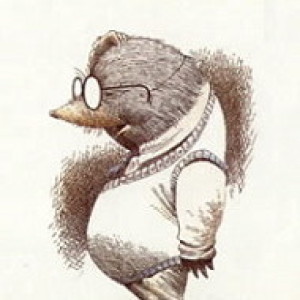In memory of Zbigniew (Bob) Kabata
Fuchsias feature very highly on my list of favourite flowers. This variety is known as Ballerina.
This blip is really just an excuse to honour, once again, the memory of Zbigniew (Bob) Kabata.
Fuchsia is a genus of flowering plants native to South America and the Caribbean. The first, Fuchsia triphylla, was discovered on the Caribbean island of Hispaniola in 1703 by the French botanist, Charles Plumier. He named the new genus after the German medical Leonhart Fuchs (1501-1566).
These days most living things are given names that are in in some way descriptive of that species. The cougar, for example is placed in the Genus Felis with the other cats and is given the descriptive specific epithet concolor, meaning same-coloured. In contrast, the brightly coloured African wild dog, the only member of the Genus Lycaon, is given the specific epithet pictus which means painted. Sometimes, however, taxonomists still name a newly discovered species after a biologist whom they wish to honour for their contributions to science. They do this by using a Latinised version of the biologist's name as the specific epithet, or, more rarely, as the Genus, or very rarely as both genus and species. My favourite by far is Bobkabata kabatabobbus a parasitic copepod that lives on fish and named after the parasitologist Bob Kabata, a very remarkable man.
Professor Zbigniew (Bob) Kabata was born in Poland in 1924. At the age of 13, young Kabata entered a military academy in eastern Poland. From the ages of 16 to 21, he fought along with other partisans in a vicious clandestine war against the Nazis. After the invasion of Poland by Nazi forces in 1939, Kabata joined the Armia Krajowa and fought against the occupying forces, leading assaults on prisoner of war camps at Opatów and Mielec in March, 1943, to free captive comrades. The unit he served in became legendary in Poland and Kabata himself was cited several times for bravery. For exceptional heroism during the war he was awarded a Silver Cross of the Order of Virtuti Militari (the Polish equivalent of the VC and the oldest combat order in the world, established in 1772), twice the Cross of Valour, the War Medal (three bars), the Underground Army Cross, the Partisan Cross and the Gold Medal for Contributions to the Defence of the Country. Kabata wrote several patriotic poems honouring the Polish armed forces. His most famous work, The Underground Army, became the unofficial anthem of the Polish combatant community and is inscribed on numerous Polish war memorials.
In 1945 Kabata pulled off a hair-raising escape and ended up in Italy. When Italy signed the peace treaty with the allies, the Polish 2 Army Corps (the unit in which he served) was moved to England. He then went on to become a North Sea fisherman and it was here, on the decks of fishing boats that he developed and nurtured a passion for science. He went on to become a brilliant student and graduated with First Class honours in Zoology from the University of Aberdeen in Scotland. In the process, he received the Nicoll Class Prize in Zoology in 1952 and again in 1954 and McGillivray Prize for the best graduate in zoology in 1955. Two graduate degrees soon followed from the University of Aberdeen: a PhD in 1959 dealing with The genus Lernaeocera in the northern North Sea and a DSc in 1966, recognizing his important scientific contributions in parasitology. His subsequent career took him to the Marine Laboratory in Aberdeen and then to the Pacific Biological Station in Nanaimo, British Columbia, Canada.
Bob is a distinguished scientist and international authority on the biology of the parasitic copepods of fish. He was awarded an Honorary DSc by the Agricultural College, Marine Fisheries Department of the University of Szczecin, in Poland, and an Honorary DLitt from the Malaspina University College in Nanaimo, Canada. For his contributions to world science he has received the A. Wardle Medal from the Canadian Society of Zoology, the K. Janicki Medal from the Polish Parasitological Society and the K. Demel Medal from the Sea Fisheries Institute in Gdynia, Poland. His combined wartime and scientific achievements have been recognized by the award of the Commander's Cross (with a Star) of the Order of Polonia Restituta. In April 2002 the Canadian Bar Association, Immigration Branch, granted him the newly established 'Immigrant Achievement Award' of which he was the first ever recipient.
Bob Kabata has enjoyed the honour of having no fewer than 21 parasites named after him. In four cases his name was used to denote the genus of the parasite, in 14 cases his name was used to denote the species, and then there is the splendid Bobkabata kabatabobbus.
Professor Kabata died in 2014.

Comments
Sign in or get an account to comment.


